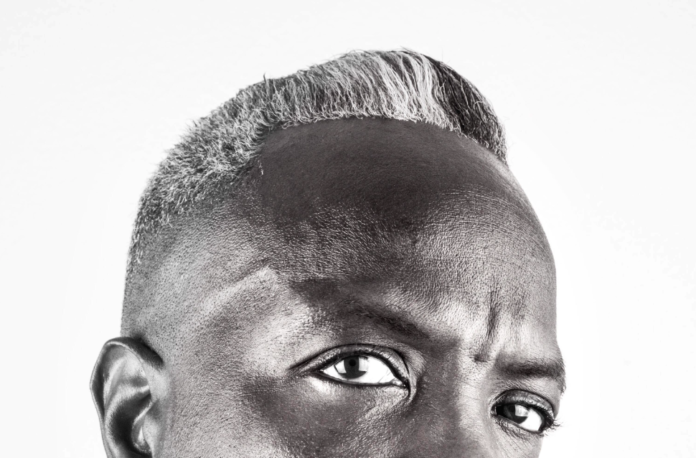Eugene S. Robinson is a singer, writer, editor-at-large, interview host, raconteur, renaissance man; descriptions and superlatives can go on as long as the 61-year-old’s life well lived. Fans of hardcore music know the New York original from his role in the nascent New York City hardcore scene and from how he bridged the gap to the West Coast by forming the band Whipping Boy while studying at Stanford University in the early 1980s. He also spun tales as a journalist, one of his many trades he’d solidify with bylines in The New York Times, GQ, Vice, and more.
The Bay Area might know him for his long-standing, homegrown acclaimed band Oxbow. Or maybe from being a gonzo MMA fight journalist (author of Fight: Everything You Wanted to Know About Ass-Kicking but Were Afraid You’d Get Your Ass Kicked for Asking), who is also a jiu-jitsu black belt. Or from his novel, A Long Slow Screw. Or from being the frontman in international hardcore supergroup Buñuel. Or from surviving the Ozy media scam from the inside. Maybe you’re even aware that he’ll be performing the Lost Boys soundtrack with The Red Room Orchestra for SF Sketchfest on Fri/19. Like many things when they come to Eugene S. Robinson, how you know him—or how you think you know him—is a matter of picking your poison.
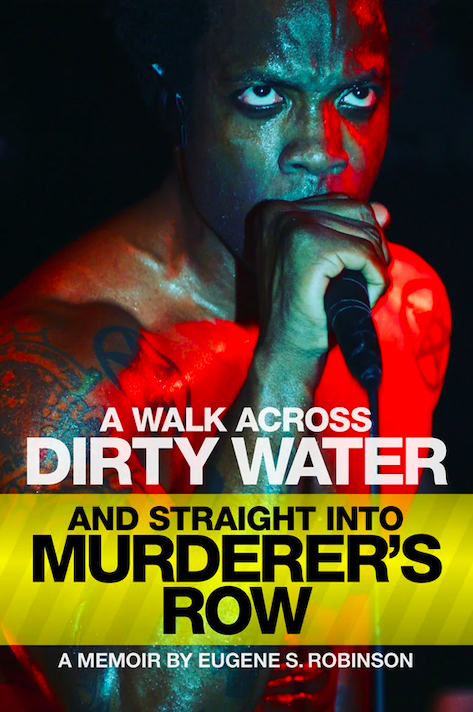
So when Robinson announced his first memoir, A Walk Across Dirty Water and Straight Into Murder’s Row (Feral House, $24.95) fans were promised a glimpse into the life of the mercurial artist ironically known for baring almost all. Robinson contextualizes his unapologetic approach to damn near everything, what can be categorized as a pathological commitment to fairness outside conventional norms, and hard won self-reflection, decades in the rearview. In examining his own life from Brooklyn to the Bay Area, and telling an early chapter in hardcore music history from his perspective, Robinson expertly examines how violence’s many forms are only dormant until it’s too late and people are left dissecting the aftermath. Through struggles with relationships, steroids, homicidal ideation, and what it takes to be an artist paving largely uncharted roads, Robinson’s memoir is one of the most compelling works to ever feature Palo Alto as a central setting.
True to Robinson’s artistry, this insider look both covers a wide, satisfying swath and maintains the mystique and curiosity that keeps crowds packing clubs around the world.
The author’s story oscillates between passing pivotal figures in hardcore music or pop culture at large and big dramatic personal beats like being a debt collector, a onetime job that he was happy to leave behind. Just because something is heavy doesn’t mean it requires a deep dive; sometimes a period is enough. After all, that’s what emphatic statements are for, and Robinson is no stranger to them.
That’s why 48hills thought it’d be worthwhile to track down Robinson around his East Palo Alto haunts and let him speak for himself on the memoir. (Interview has been edited for length and clarity).
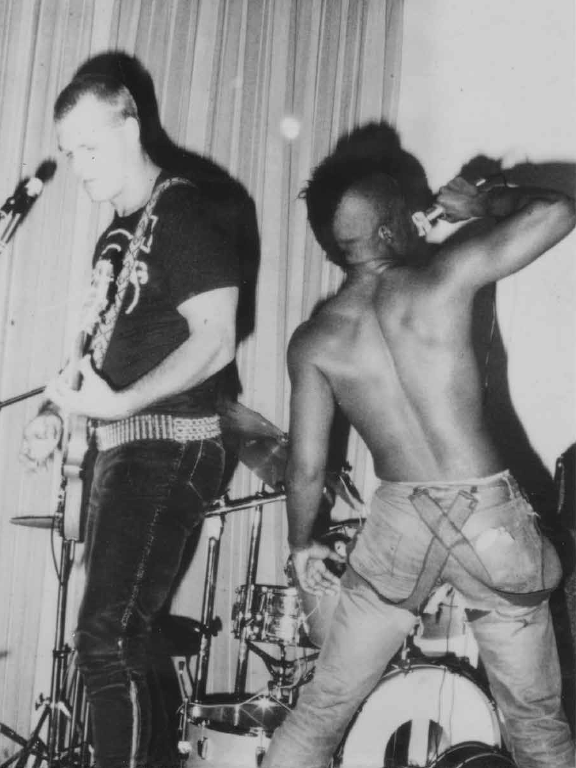
48HILLS Tell me about your process writing this memoir. How did you separate it from what you publish on your Substack, your journalism, and parse a life well traveled and lived?
EUGENE ROBINSON It was easy because … if you’ve been in a band, you’ve been reading your own reviews for years … It seems to me that they were suffering from confusion. I wanted to inform people’s understanding of the music by getting them closer to me in a way that’s only possible in the age of the internet, hence the Substack, which really started as a place for my OZY articles they wouldn’t publish. More specifically, the Thin Black Book, a companion to the Thin Black Duke [Oxbow album]. We just got tired of being the products of uninspired journalism where people just go, “OK, crazy negro, I gotcha, half dressed, likes to fight.” It’s like no, none of this stuff is accidental; all of it is on purpose and this is where it came from.
A lot of those stories, I hadn’t actually told before. It was really kinda liberating to put them down. Like it or not, this informed the person that makes this music. It’s kinda for completists; if you’re really into Oxbow, or American hardcore from a certain period, or a New Yorker-phile, some of this stuff will really hit home for you in a really serious way.
48HILLS What was liberating about it?
EUGENE ROBINSON The scene in the early days had this weird politeness. On the one hand it’s good, you don’t want to be the shit-talking guy, but on the other hand, I think it stifled real dissent. You had things you could say, things you couldn’t say, you didn’t want to hurt anybody’s feelings because people were touchy and had long memories. My only indication for this was, is it true? Eventually, I come to like a dividing line, a fork in the road, where I’d be like, “Man, this is kind of unkind,” and I go, “Yeah, what are you afraid of?” Afraid [Henry] Rollins is going to kick your ass? Not going to be your friend? None of this stuff is intentionally pejorative. I’m not maligning anybody, I’m just describing things that have happened.
In other words, in order to speak one true thing, or in this instance, several, was pretty liberating after years of just trying to be a musical politician where you don’t talk about what you don’t like because you don’t want to hurt anybody’s feelings because they put a lot of work into it too. Fuck that grade school, after school special shit. If you were a dick to me, it was really liberating to say you were a dick to me.
48HILLS You discuss in the book taking a lot of LSD, and having dealt with concussions in college. I don’t know if you remember our old colleague Zeus Tipado has been doing a lot of research on psychedelics’ power on cognitive function — can you speak anecdotally about how those elements might have converged for you?
EUGENE ROBINSON I quit rugby as a result of having two concussions and liking fighting more than I liked the actual running that was involved in rugby. I swear to God, [LSD] made me a better person.
The drugs that I’ve taken that have had a deleterious effect, long term of course—and I’m not jumping on this bandwagon—have been steroids, for no other reason than, your adrenal glands sit at the top of your kidneys, and when you have a fight or flight [response], adrenaline squeezes into your kidneys, where it metabolizes into your system, right? The vessels that carry it, as a result of heavy steroid use, get distended. What this means is, when you have a need for adrenaline, instead of having a narrow pipette to go through, I now have a big tube that it goes through, so I tend to get colossally angry really fast, and I’ve learned to mitigate that over time.
Psychedelics and getting your head together, as the result of having been a fighter, my guess, my strong feeling—despite the one very popular instance where the guy tore out his training partner’s heart—I would think that it can do nothing but help. A good portion of this is a head game, and anything that would increase your level of introspection, I think would be comfortably good, but you see, I always took [LSD] with really smart people. I had a friend who took it with people who weren’t that smart and said it was worse than watching bad TV. Timothy Leary said it best: it’s about set and setting; if you’re the smartest person in the room, you probably shouldn’t be taking LSD with the room.
48HILLS At Stanford, you were friends with actor Andre Braugher. How was it for you experiencing his recent passing?
EUGENE ROBINSON It was a surprise. I remember when he started smoking, I remember telling him he shouldn’t smoke and he was like, “Ah, what’s the last five years of your life?” Did it end up being that way? But I’ve been—men die. My expectation that any man I know is going to be alive long term, myself included, is low.
I’ve found it traditionally much more disturbing, exes of mine who’ve died, in odd moments you have erotic thoughts about an ex maybe, and you realize, I’m having an erotic thought about a dead woman. That’s kinda weird. Only one guy I know put a fine point on it, he wrote a story for me at some point called, “I Had Sex with a Dead Woman.” [laughs] I never thought about my exes dying, but now of course, at this point in time, as a result of COVID, I think I’ve lost a couple.
48HILLS Recounting your life in a story collection like this, was anything surprising for you having to go back and revisit everything?
EUGENE ROBINSON It was a real big fucking drag to have to relive those dire years of 18 to 21 [years old]. That wasn’t too fun to recount that. I’ve heard writers say, “That was really tough to write,” and I’d go, “What the fuck are you talking about? You’re writing, it’s a job, you just do it.” However long it took me to write those sections, it was a real drag. It was a real drag to remember having been there.
It reminded me of the first MMA match I had where I got knocked out at the end of the first round by Chris Sanford. Then, because it was so close to the end, they were like … “You choose.’ I said, “I’m good for the second round.” I go out for the second round. I get choked out, which was merciful of him; he could have knocked me out again. That was my first one. I went on to fight 11 more times and had a record of 9-3, so I can live with that, but they gave me video of the match. I can see what I did wrong. I got home, I put it in. I fucking couldn’t watch it. Yeah, I know I could learn a lot here. I couldn’t watch it. I was like, “fuck that.” So having to relive 18 to 21, was not very cool. I didn’t enjoy it.
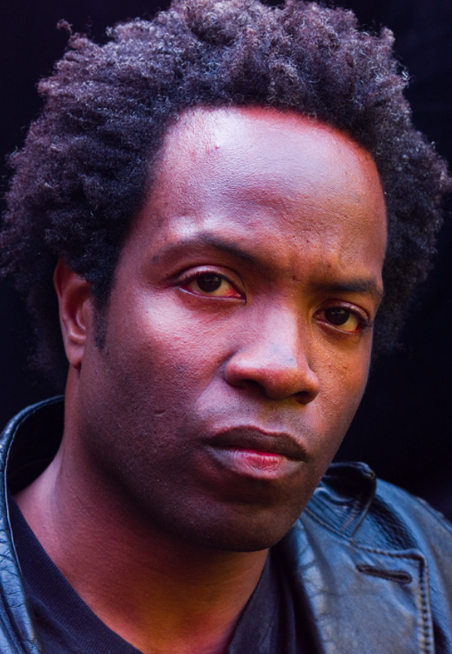
48HILLS So you would say being 18 to 21 years old is worse than watching yourself get knocked out on tape.
EUGENE ROBINSON Yeah, it’s on par, you at your lowest point. Traditionally, for everybody, you will never be weaker than you were as a young man.
48HILLS I know you’re not the type necessarily, but there’s not a lot of romanticism for the life of being piled in a van and going gig to gig for X amount of money to get through the night.
EUGENE ROBINSON People think because The Rolling Stones and Led Zeppelin, people think it’s the shit. That it’s a never-ending party, but it’s a party that ends, man. Like Rollins was saying, I could see doing music again but I can’t see getting in a van again with bunches of people. That’s the thing: I don’t mind getting in the van.
48HILLS A mantra of yours that you touch on in the book is making “Quick Time About Town.” How has that informed your life beyond the music?
EUGENE ROBINSON Some people would call it cynicism, but it’s helped me healthily avoid internet fights, which have really leaked into our public discourse. The thing with Kid Nate [referring to falling out with his MMA podcast co-host] actually ended a 14-year friendship because he didn’t like my attitude on his theory on Russia and the Ukraine. Isn’t that fucking insane? My point of view, if it doesn’t keep me from making quick time across town. I could give really give a fuck. I could really give a fuck. Oh the tragedy, tragedies are like the line from Bad Lieutenant with Harvey Keitel: “Women get raped all the time, just because she’s a nun, what’s the difference?” Tragedies are all over the place. I don’t sit on the board at The Hague. I’m not a member of the U.N. What can I do?
48HILLS I’ve seen all your reposts of people posing with the book. Has anyone reached out about the book you weren’t expecting?
EUGENE ROBINSON Danko Jones … that surprised me. The [Steve] Albini thing, Thurston Moore, Lydia Lunch, Harley Flanagan, jimi izreal, their tributes I found really surprising.
48HILLS What would 18-year-old Eugene think about Lydia Lunch providing a foreword to the memoir?
EUGENE ROBINSON Absolutely incredible. [laughs] What’s more incredible to me is as close as we’ve been over the years is that I’ve never fucked her. A little candid talk, we actually slept in the same bed, and I was like yeah, I’m not going to make a move. That’s my move. Not making the move [laughs].
48HILLS The book details some of your earliest music recordings. Has the response to the book brought about any renewed interest in Whipping Boy?
EUGENE ROBINSON One of the things that’s happened as a result, we figured just because of the time and hardcore, Mura Mura (1984), the second, really weird Whipping Boy record never got its fair shake, and I realized that singularly existed because I was writing lyrics that weren’t hardcore lyrics. So you had to have music to go along with it, or the music came and I wrote lyrics for them; we decided to, in the aftermath of this [memoir], there’s been some energy put into re-releasing Whipping Boy’s weird shit, shit from the first record that you listen to that you’re like what, like “Cracked Mirror,” all this keyboard stuff, why is that on there? Putting out a record of, if people were as open-minded as they are now, then it would have been greeted with open arms versus, “This isn’t hardcore! Fuck that.”
The tapes are being burned right now. Because if you have tapes that are 30 years old, you actually have to bake them in an oven so there’s not oxide dropoff. Then they’ll be transferred into Pro Tools and then [redacted] is going to remix it. Klaus Flouride, who produced it, was a fairly new producer at the time, so we have to imagine it can’t be anything other than an improvement.
48HILLS This has to be the most interesting book written with Palo Alto as a primary setting.
EUGENE ROBINSON I kind of tried to get a little of that in, that when I got here it was a very different town, it was actually a college town versus a high-tech town, even judging it 1980 from what you see now is crazy, it’s really wildly different.
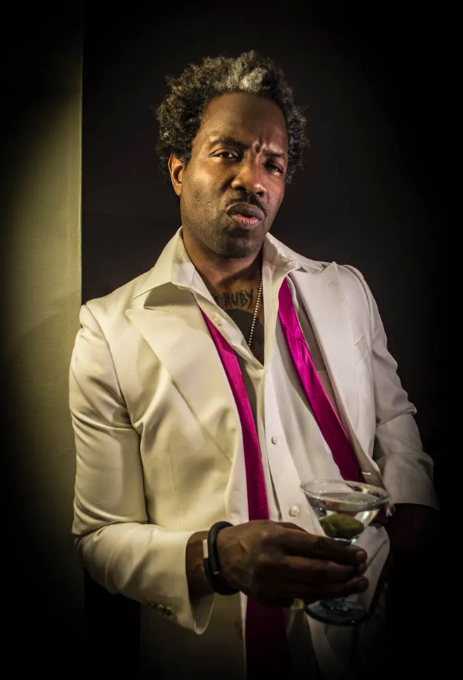
48HILLS You’ve been here the whole time.
EUGENE ROBINSON 1987, I took the money from Leonard Part VI [yeah, Eugene was a background character in a Bill Cosby movie] and bought my first house like three blocks over [in East Palo Alto] …
You could buy here, because I’m sitting in what used to be the murder capital of America. Even in 2014 when I bought this place, there were run and gun battles in the street. That stop sign there used to be all shot up from the douchebags on the corner, who in 2014 thought it’d be real fun to set a police car on fire. The police station is a few blocks over, then they ran home, so the next day there was yellow tape all around the block because the cops came in and arrested everybody. Since those scumbags have been gone, it’s been a pretty nice neighborhood.
48HILLS You deal with a lot of heavy topics in the book, especially around violence in many iterations. How’d you know when to push and pull as you navigate those narratives in these essays?
EUGENE ROBINSON It’s what’s obsessed me. If I’ve been obsessed enough to have some thought about it, whether it’s politics, I thought it was pretty necessary to get beyond the facile understanding of good guys and bad guys. These are complex relationships born out of our biological connections and needs. I’m writing for a very specific audience and generally any publication that I’ve worked for, they’ve always said this really unkind thing: “You have to write as if who you’re writing for is stupid.” I can’t. I can’t. I have to imagine the people I’m writing for are at least as smart as me, so they can find me. If it’s over your head, if you’re not into it, then fine, that’s fine.
48HILLS You dedicated your book to your family. Have you got feedback from them now that it’s available?
EUGENE ROBINSON They bought it; they haven’t critiqued it. My mother did, she critiqued it, she liked it, she said she was sad to get to the end. Two of my kids have bought it. My attitude, my feeling is it’s best if you get the book and just act like you never got it [laughs].
Some people I do crossfit with, they’ve got it and not said anything, and I think I prefer that, you know? It’s not for me—a friend of mine, Jamie Stewart from Xiu Xiu, he put a book out, and he said, “If you’re related to me, please don’t read this book.” Which I thought that was very funny. Two of my kids have gotten it and they were nervous. I go, “Why are you nervous?” They said, “It’s kinda weird reading about your dad before you were around, but we wanna know.” Presumably, they’ve finished it and had no comment. I go, that’s best. It’s weird, it’s not like a novel or the fight book; I’m in a very plain way, writing about my life. It’s kinda like if you don’t like it, you don’t like me, but at least it explains why you don’t like me.
48HILLS The book is about 250 pages, and the pace really picks up near the end. I feel like there was a lot left on the table, but if you were in a big label band, you could justify doubling the book’s length.
EUGENE ROBINSON The same reasons I didn’t want to write the first memoir are very much in evidence for writing another one. Gore Vidal did two right, I thought who needs two? Thurston Moore, who I love and just did the [blurb] for me, he wrote his [autobiography], it’s like 966 pages. I’d like to think that people love me enough to read [that], but that’s kinda punishing.
I thought a good ending point was the creation of Oxbow. It gets you up to understanding who that guy was who created Oxbow. Then I don’t have to write stuff that would offend my family. That’s the big issue. The creation of Oxbow was born out of a certain insanity. I don’t know that my kids need to be reading that. I don’t know that my ex-wife needs to be reading that. I don’t know that anybody needs to be reading that.
A certain amount of money would make it possible for me to think that was a good idea but right now, I don’t want to hurt anybody’s feelings despite what I just said about hurting feelings. If it’s somebody in the music scene, what do I care about your feelings? We’re friends or at best, at least known associates, but if you’re a friend or family, chances are we have a long-term relationship. I read Klaus Kinski’s book where he talks about all his sexual conquests, and he was immediately sued. That’s always going to be much more entertaining to the person writing it than the person reading it, especially if the lawyers backed him off where he couldn’t mention names. Mentioning names wouldn’t help in my instance at all.
I’ve not been the greatest guy; it takes a certain amount of something to induce me to reveal, for what, peanuts, pennies, to amuse you? Nah, I’ve squared myself with who it is that I am and how I am.
There’s a weirdness too. [UFC champion] Matt Hughes, his [auto]biography was really weird because he looked at it like an occasion—you don’t need granular detail on how horrible you’ve been. That doesn’t illuminate the larger story. You have to be your own best, first editor. For me, it’s like making a movie of you is what I used to tell some of my writers in my true stories section. The movie is about you, so make it as interesting as a movie. I don’t need the eighth story about “I met this woman at a bar,” unless it illuminates the larger story. Being a good editor or at least having a good editor helps.
48HILLS One thing that struck me about the music in the book was a section where you write about learning everything you need to know to put out a record in an hour. Is that something comparable you can say to artists now?
EUGENE ROBINSON You can’t anymore. When Hydra Head [Records] exploded, there were two schools of thought. One said, do it yourself, you don’t need a record label, do your own deal. The second was, get a record label and I’ll help you. We decided to go with the latter. Friends of ours in The Austerity Program did the former. I realized sometime during the latter portion that it is impossible to do what I did back then, now.
There’s just too many strands for one or two people: radio, press, retail, digital, there’s just too many different threads and strands to get this stuff straight, one or two people. There’s no way. There’s no way you can deal with all these distribution channels and line it up timing wise, work with a booking agency and PR people. It’s impossible. You need a team to make this work.
48HILLS So what’s more bleak, media or music?
EUGENE ROBINSON Media, because people will still show up to shows and pay money to get in. Actual cash transition, actual money passing hands, versus I don’t know anybody who really subscribes to anything they don’t pay for, and even people who subscribe to my Substack, it’s much cheaper than buying a ticket to an Oxbow show.
Last time I heard ticket prices to Oxbow shows, I was shocked. I was like man, I thought we were still charging five dollars for tickets because I’m so stuck in the hardcore way of thinking. People paying $75 for tickets to Oxbow shows—that’s madness.
48HILLS Anything else you can tell us about what’s ahead with the music?
EUGENE ROBINSON We recorded 21 songs during the [Oxbow] Love’s Holiday session. We’ve released nine with this weird interstitial thing to make it 10. That means we’re trying to talk about how to handle the other 11; is it worthy of a record? Do we release a bunch of seven-inches? Do we do EPs? What formats make sense? That’s a decision that has to happen for 2024.
Also, Buñuel has a record called Mansuetude that comes out in May, so in May I go two weeks in America with Buñuel, come back, decompress for a little bit, go out at the end of June for two weeks with Mr. Bungle over in Europe, so it’ll be a busy time. Book tours in or around all of this stuff. I did book tours on the Fight book and A Long Slow Screw for up to two years after the book was out because people were still purchasing the actual book.
I got screwed over by Harper Collins because they ignored my very specific contract proviso that [Fight] not be turned into a digital offering and they did it anyway. I knew it the day it happened, because people started downloading it. That made it harder and more pointless to sell a hardcover book.
48HILLS Thanks for your time, Eugene. You’re a Bay Area institution. People just don’t know it.
EUGENE ROBINSON [laughs] That’s perpetual. That’s lifelong. Best-kept secret. I’m still meeting people at shows … people who are into this type of music …we played in Portland, and some guy came up to see [the support band], guy goes, “I love you guys! I’ve never heard of you before.” I go, “How is that even possible?” We’ve been doing this since 1988, same neighborhood, same fan base … just missed it.
Buy A Walk Across Dirty Water and Straight Into Murder’s Row here. Get tickets to see Eugene Robinson perform the Lost Boys soundtrack with The Red Room Orchestra on Fri/19 here.

